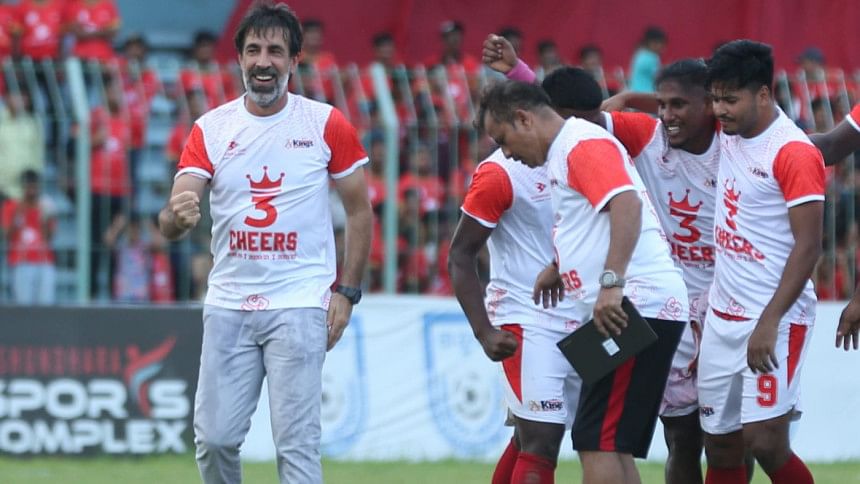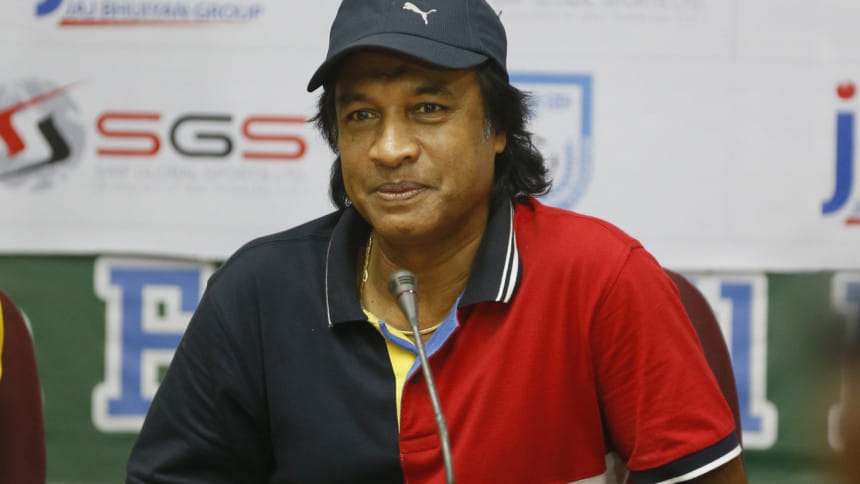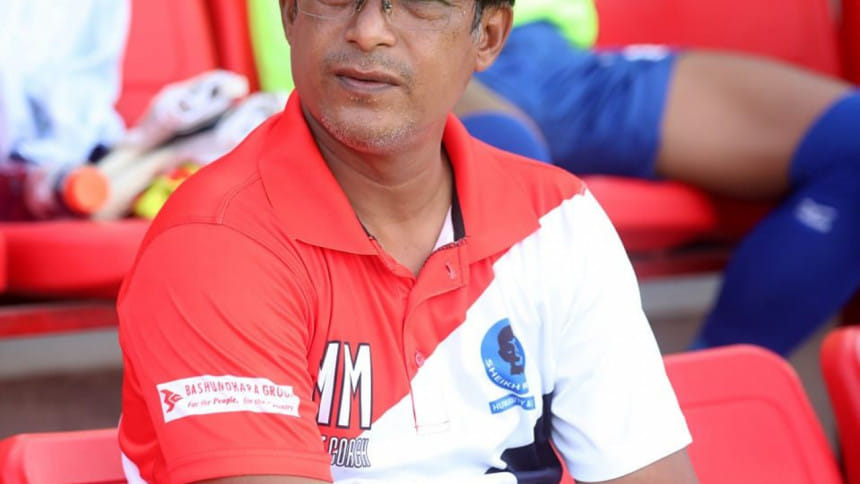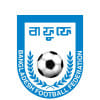Local elite coaches in uncharted territory

Foreign coach hiring is common in global sports such as football, particularly among national teams. Bangladesh is no different in this regard, although this practice has extended in full force in the country's top-flight domestic circuit of late -- leading to the marginalisation of similarly qualified local coaches.
Until the most recent edition, the country's successful top coaches -- the likes of such as Shafiul Islam Manik, Maruful Haque, Saiful Bari Titu -- were active in various capacities with the top clubs of the professional football league (BPL).
Surprisingly, none of them have been with the BPL outfits this season in the face of the influx of foreign expertise brought on by the entry of new outfits in the professional era.
Speaking with club officials as well as the country's top coaches, The Daily Star attempted to figure out the reasons for why the appointment of foreign coaches are preferred over the locals. But first, it's worth revisiting that the recent reality in Bangladesh did not follow the progression of the preceding decades.
A LOOK BACK INTO THE HIRING TREND
In Wiliam Bill Hart from Ireland, Abahani had been the first club to hire a foreign coach for domestic competitions in 1974, but the rest of the clubs relied on local coaches -- such as Ali Imam, Sheikh Shaheb Ali, Abdur Rahim, Abdul Gafur Baloch, Golam Sarwar Tipu, Wazed Gazi, and others -- the majority of whom do not own coaching certificates till date.
Except for Abahani and Mohammedan, the trend of appointing local coaches continued for a few seasons, with national-footballer-turned-coaches stepping in to fill the shoes of their predecessors until the late 1990s -- most notably, Kazi Salahuddin, Enayetur Rahman Khan, Amalesh Sen, Abu Yousuf, Shahiduddin Ahmed Selim, Hasanuzzaman Khan Bablu, and Abul Hossain.
The trend shifted after 2000, with certified coaches such as Manik, Titu, Maruf, Mahmudul Haque Liton, Syed Golam Jilani, Mahbub Hossain Roxy, Faisal Ahmed, Abdul Quaiyum Sentu, Kamal Babu, Jakaria Babu, and others entering the coaching profession as the introduction of the country's professional football league played a pivotal role.
Now, there are nearly 1200 educated coaches in five categories ranging from BFF grassroot to AFC pro diploma, but in recent years, the top-flight football - Bangladesh Premier League - has seen a noticeable transformation in its coaching landscape, with local coaches facing increasing competition from their foreign counterparts.
WHAT THEY SAID
"From the start of the Bashundhara Kings' journey, foreign coaches have been appointed, but that doesn't mean we don't have good local coaches. We take some things into account before appointing the coach," Bashundhara Kings president Imrul Hasan told The Daily Star.
"The issue with appointing a local coach is that it creates isms among the players and they also try to interfere with off-the-field issues. The top two or three coaches in the country are also not beyond these concerns, thus we usually hire foreign coaches," he added.
Mohammedan SC director and football committee secretary Abu Hasan Prince remarked, "When we take the decision of appointing a head coach, whether foreign or local, we basically consider two things - the first is the merit of the coach, and the second is the club's financial ability."
"There are four to five Pro Diploma coaches in the country and they should be provided by the clubs," said Prince, adding that they reappointed local coach Alfaz Ahmed following his success in last year's Federation Cup and their financial consistency of running season.
Md Fakhruddin, director of mid-table outfits Sheikh Russel KC, stated, "We don't follow any policy to appoint either a foreign or a local coach, rather we appoint a coach based on the decision of the board of directors. We are not concerned with results at this time; rather, we want to produce some quality players, which is why we have hired a quality international coach."
"Because the BPL takes place in different districts with different problems, the local coaches and players can handle them smoothly. Furthermore, many players do not understand the language of the foreign coaches, so we appoint local coaches who are also doing well," said Rahmatganj MFS general secretary Imtiaz Hamid Sabuj, adding that the financial situation is also an important factor in the appointment of a coach.
Brothers Union manager Amer Khan said, "We are not a team like the corporate houses run. As a result, when hiring a coach, the financial considerations come first. We believe that the foreign coach can manage the foreign players if the monthly wages are delayed, so we frequently prefer the foreign coach."
Successful coach Shafiqul Islam feels that the clubs' financial situation is one of the primary reasons for the clubs' failure to recruit local top coaches.

"If coaching style and pattern mattered in appointing coaches, then local coaches like Maruf and Titu should have gotten the job. Because the top two to three clubs always appoint foreign coaches, the rest of the clubs could not make an effort to appoint coaches like Maruf, Titu, and me," said AFC A licence coach Manik, who has 10 titles and 12 runners-up trophies to his name.
"If the club management considers success, Mintu should be retained as coach of Sheikh Russel KC, who played the Independence Cup final last season under his guidance. To me, a coach's success rate is to improve the club's place based on the team they are provided with during the season," Manik explained.

AFC Pro Diploma coach Saiful Bari Titu stated that the hiring of a foreign or local coach is totally at the discretion of the club management.
"Appointing the coach is entirely the choice of the club management, and the coaches have no say in the matter. However, success is an important component in club football. If you don't deliver success, the club management will not allow you to continue," added Titu, who has three trophies to his name, including an international cup.

INCLUSIVITY VITAL FOR LONG RUN
To sum up, the financial conditions of the clubs, the success rate of the coaches, the handling of foreign and local players, the engagement of coaches in off-the-field matters, and the language barrier have all been key factors in the appointment of either foreign or homegrown coaches at the club level.
Nonetheless, the influx of foreign coaches and players assists clubs in acquiring quality coaches and world-class footballers, thereby raising the standard of domestic competition. However, an approach that integrates both foreign and local coaching talents does wonders for the greater good as it creates a dynamic coaching environment that benefits both local coaches and the country's football in the long run.

 For all latest news, follow The Daily Star's Google News channel.
For all latest news, follow The Daily Star's Google News channel. 








Comments